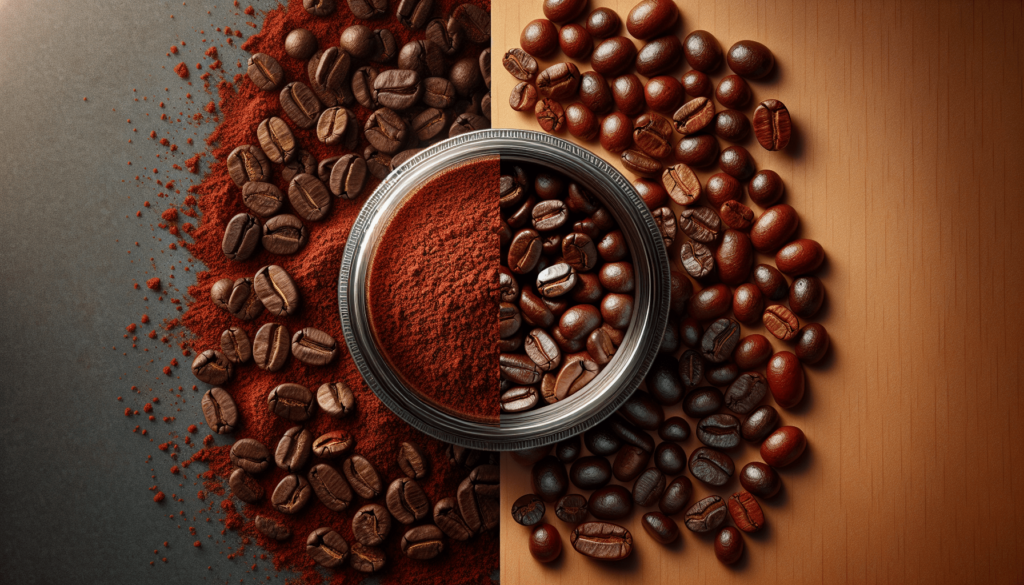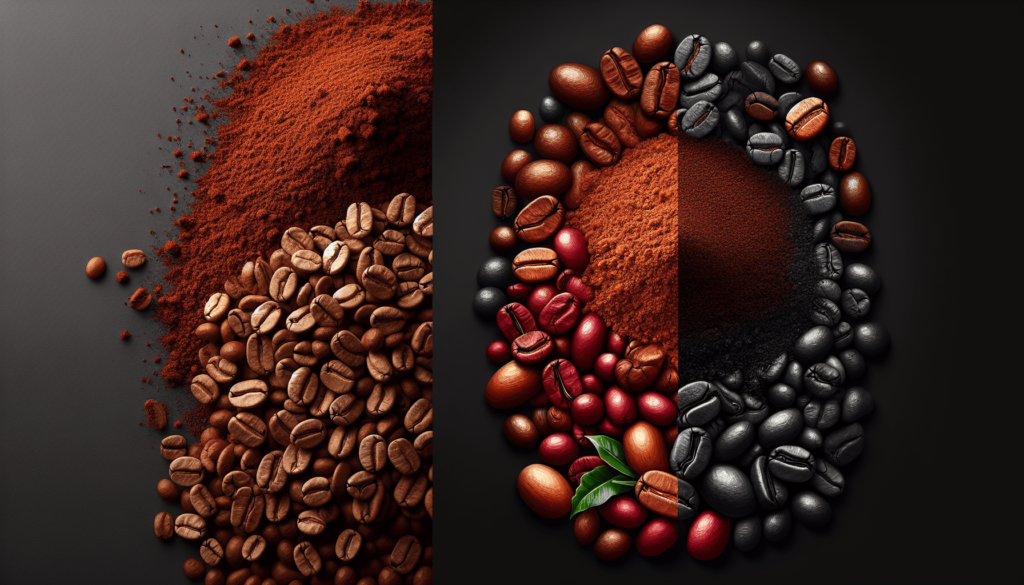Have you ever found yourself standing in the coffee aisle, contemplating whether to go for a bag of ground coffee or whole coffee beans? This is a common dilemma for coffee lovers worldwide. The brewing journey begins long before hot water meets ground coffee, and your choice between pre-ground and whole beans can significantly influence your coffee experience. This article aims to help you understand the nuances between ground coffee and coffee beans, ultimately helping you decide which option suits you best.
The Basics of Coffee: Understanding the Two Options
Let’s first get to the basics of what we’re comparing. Ground coffee and coffee beans offer two very different experiences, both in the process and the final taste.
What Is Ground Coffee?
Ground coffee is essentially beans that have already been roasted and ground. The grind size can vary, typically ranging from coarse to fine, depending on what brewing method it’s suited for. Ground coffee is convenient because it saves you the hassle of grinding your own beans every time you make a cup.
What Are Coffee Beans?
Coffee beans are raw imports from nature. They come either in their raw (green) form or roasted, usually in sealed bags with varying flavors and roast levels. To drink coffee from beans, you’ll need to grind them yourself using a grinder before brewing them.
The Debate: Ground Coffee vs. Coffee Beans
Both ground coffee and coffee beans come with their own set of benefits and drawbacks. Below, we will break these down for easier understanding.
Convenience and Accessibility
One of the most significant factors to consider is how convenient each option is for your daily routine.
Ground Coffee
- Ready to use
- Ideal for quick brew
- Less preparation time
Coffee Beans
- Requires a grinder
- Need to grind before each use
- Can give a more custom grind size for different brewing methods
Freshness and Flavor
Freshness and flavor can significantly impact your coffee experience, and this varies significantly between ground coffee and coffee beans.
Ground Coffee
- Starts to lose flavor and aroma soon after grinding
- Shorter shelf life
- Easier to go stale
Coffee Beans
- Stays fresh longer when stored properly
- Richer flavor and aroma when freshly ground
- Can be ground to your preferred size just before brewing
Quality Control and Consistency
Another critical aspect to consider is the level of quality control and consistency you can expect from each option.
Ground Coffee
- Quality can vary from batch to batch
- Can be subject to inconsistent grinding sizes
- Mixed blends can lead to a consistent but sometimes inferior product
Coffee Beans
- Higher level of quality control
- Consistent grind quality if you have a good grinder
- Ability to choose single-origin or high-quality beans
Customization and Versatility
Customization options can significantly influence your coffee journey. Here’s how the two options compare when it comes to versatility.
Ground Coffee
- Limited customization
- Pre-determined grind size means you have to stick to a set brewing method
Coffee Beans
- Full control over grind size for different brewing methods
- Customize each cup to your taste preference
- Flexibility to experiment with new methods and flavors

The Process: From Beans to Brew
Understanding the coffee-making process for both options can also help you gauge which one is better suited to your needs and lifestyle.
How to Use Ground Coffee
Ground coffee requires minimal preparation. All you need to do is measure out the amount you need, place it in your coffee maker, and start brewing. The simplicity makes it a go-to for many, especially busy individuals or those new to coffee-making.
How to Use Coffee Beans
While using coffee beans requires an extra step, the added effort can pay off in taste and quality. Here’s a simple guide to help you get started:
- Choose Your Beans: The type of beans you select will significantly affect the flavor of your coffee.
- Grind Your Beans: Use a grinder to grind the beans right before brewing. The grind size should align with your chosen brewing method.
- Measure and Brew: Measure the ground coffee as per your recipe and begin brewing. The freshly ground coffee will have a richer, more aromatic profile.
The Science Behind Coffee Freshness
Freshness isn’t just a buzzword in the coffee world; it impacts both the taste and quality of your brew. Here’s a breakdown of how freshness plays a role in both ground coffee and coffee beans.
Oxidation Process
The oxidation process kicks in as soon as you grind coffee beans. The exposure of grounds to air accelerates the breakdown of organic compounds.
Ground Coffee
- Accelerates oxidation process due to more surface area
- Flavor and aroma deteriorate faster
- Typically, best consumed within a couple of weeks
Coffee Beans
- Slower oxidation process due to the intact structure
- Keeps components locked in longer
- Shelf life extends to a few months
Storage and Shelf Life
Proper storage can make a significant difference in maintaining the freshness of your coffee, whether it’s ground or beans.
Ground Coffee To extend the shelf life of ground coffee:
- Store in an airtight container
- Keep in a cool, dark place away from direct sunlight
- Avoid moisture to prevent mold growth
Coffee Beans For coffee beans:
- Use airtight containers
- Store in a cool, dark place
- Grinders that double as storage containers can be a great investment
Aroma Retention
The essential oils and aromatic compounds in coffee contribute to its unique flavor and are highly volatile.
Ground Coffee
- Essential oils can evaporate quickly
- Aroma intensity decreases over time
Coffee Beans
- Helps retain essential oils
- Grinding just before brewing captures the full aroma

Budget Considerations: How Cost Affects Your Choice
Pricing is always a key factor when making any purchase decision. Here, we break down the cost implications of choosing between ground coffee and coffee beans.
Ground Coffee Costs
- Generally cheaper upfront
- No additional equipment needed
- Bulk buying can offer discounts but may impact freshness
Costs of Coffee Beans
- Slightly more expensive due to quality control
- Requires investment in a grinder
- Better long-term value with higher quality and flavor
Cost Comparison Table
| Aspect | Ground Coffee | Coffee Beans |
|---|---|---|
| Initial Cost | Lower | Higher |
| Additional Equipment | None | Grinder (Cost varies) |
| Long-term Value | Dependent on freshness | Generally better due to quality and customization |
Sustainability and Environmental Impact
Your choice can also have an environmental impact, and it’s increasingly important to consider sustainability when making purchasing decisions.
Ground Coffee
Ground coffee tends to come with more packaging. Single-serve pods and packets, while convenient, contribute to waste.
Coffee Beans
Coffee beans typically come in large, resealable bags, which can be less wasteful in the long run. Additionally, by purchasing whole beans, you’re more likely to buy from vendors who promote sustainable farming practices.
Coffee Brewing Methods and Their Compatibility
Different coffee brewing methods require different grind sizes, so let’s see which option is more versatile in accommodating various methods.
Drip Coffee Makers
Ground Coffee
- Usually pre-ground to a medium size, suitable for drip makers
Coffee Beans
- Can grind to preferred medium size, offering flexibility
Espresso Machines
Ground Coffee
- Needs to be ground specifically for espresso, often requiring purchasing a special type
Coffee Beans
- Grind to the fine consistency required for espresso, offering freshness
French Press
Ground Coffee
- Must be bought in a coarse grind or found in limited options
Coffee Beans
- Easily grind to a coarse size right before brewing for optimal results
Pour-Over
Ground Coffee
- Medium-fine grind pre-packaged, limiting flexibility
Coffee Beans
- Can customize grind to achieve the perfect flavor extraction
Myths and Misconceptions
There are many myths surrounding the debate between ground coffee and coffee beans. Let’s debunk a few.
Myth 1: Ground Coffee Is Always Inferior
Not necessarily true. High-quality ground coffee can still yield a tasty cup, especially when it’s freshly packaged and consumed quickly.
Myth 2: Grinding Your Own Beans Takes Forever
With the right grinder, it takes less than a minute to grind beans for a fresh brew. The extra step is often worth the improved flavor.
Myth 3: Pre-Ground Coffee Is More Affordable
While initially cheaper, ground coffee may lead to more waste due to its shorter shelf life, leading to potential savings with coffee beans.
The Role of Grinding in Coffee’s Aroma and Flavor
Grinding your coffee beans is more than just a process—it directly impacts the final taste and aroma of your coffee.
Size Matters
Different brew methods require different grind sizes to optimize flavor extraction. Here’s a quick guide:
| Brew Method | Ideal Grind Size |
|---|---|
| Espresso | Fine |
| AeroPress | Fine-Medium |
| Pour Over | Medium |
| Drip Coffee | Medium |
| French Press | Coarse |
Consistency
Inconsistent grind sizes can lead to under-extraction or over-extraction, negatively impacting the coffee’s taste. Coffee beans give you the flexibility to control the grind size.
Freshness and Immediate Use
When you grind coffee beans just before brewing, you preserve the essential oils and aromas that contribute to a richer cup.
Grinding Tips and Best Practices
If you decide to switch to whole beans, here are some grinding tips to ensure you’re making the most out of your coffee experience.
Invest in a Good Grinder
A quality grinder makes a world of difference. Burr grinders are generally considered better than blade grinders for their consistency and uniformity.
Grind Just Before Brewing
To keep your coffee as fresh as possible, grind your beans just before brewing. Prepped grounds should be used within a few minutes for the best results.
Match the Grind Size to Your Brewing Method
As discussed earlier, the grind size should align with your brewing method to ensure optimal extraction and flavor.
Making the Final Decision
Your choice between ground coffee and coffee beans likely boils down to personal preference and lifestyle. Let’s summarize some key factors to help you decide.
Convenience
- Ground Coffee: For those who prioritize convenience and speed.
- Coffee Beans: For those who are willing to put in a little extra effort for a better-tasting cup.
Freshness and Flavor
- Ground Coffee: May lack the rich aroma and flavor but still delivers a quick and easy brew.
- Coffee Beans: Offers a superior taste and aroma but requires a grinder and a bit more time.
Cost
- Ground Coffee: More budget-friendly in the short term.
- Coffee Beans: A worthwhile investment for those who value quality and customization.
Environmental Impact
- Ground Coffee: Usually comes with more packaging waste.
- Coffee Beans: Fewer packaging materials and often more environmentally friendly options available.
Versatility
- Ground Coffee: Limited by the pre-existing grind size; less versatile.
- Coffee Beans: Offers complete control over grind size, making it versatile for different brewing methods.
Final Thoughts
Choosing between ground coffee and coffee beans can be a tough decision, but it ultimately boils down to your priorities. If convenience suits your busy lifestyle, ground coffee might be the way to go. However, if you value freshness, flavor, and are up for a bit of extra effort, coffee beans could be your best bet.
With this comprehensive guide, you should now be in a better position to make an informed choice. Your coffee journey is a deeply personal one, and understanding the impact of your choices can make every cup a little more satisfying. Enjoy every sip!
